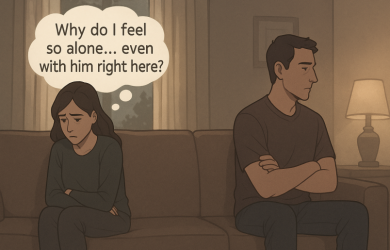15 Telling Signs Your Wife Is Unhappy & What to Do About It

Unlock Daily 30-Sec Tips for a Happier Relationship
👉 Subscribe FREEKey Takeaways
Marriage.com AI Quick Summary
A successful marriage requires falling in love many times, always with the same person. – Mignon McLaughlin
But what happens when love feels distant, and the connection you once shared begins to fade? Imagine this: your once-cheerful wife now seems withdrawn, quick to anger, or uninterested in spending time together.
You notice subtle changes—she avoids conversations, spends more time on her phone, or seems disconnected from family life. Are these just passing phases, or could they be signs your wife is unhappy?
Have you asked yourself why she seems distant or if there’s more you could do to make her feel valued? What if her silence is masking deeper struggles she doesn’t know how to express?
The good news is, that recognizing these behaviors early gives you a chance to understand her needs and rebuild your bond.
Research shows that emotional neglect in relationships often leads to dissatisfaction, but proactive communication can significantly reduce unhappiness.
This article will take you through clear signs your wife is unhappy and, more importantly, what you can do to address them.
By understanding these signs, you’ll gain the tools to build a stronger, healthier connection with your partner.
What causes unhappiness in marriage?
Marriage is often viewed as a partnership built on love and mutual support. However, many couples encounter challenges that can lead to sadness. Understanding the root causes of unhappiness can help partners recognize the signs your wife is unhappy and foster a healthier relationship.
Here’s a deeper look at some of the most common factors that can lead to unhappiness:
1. Lack of communication
Effective communication is the foundation of any healthy relationship. When couples stop communicating openly and honestly, misunderstandings can arise, leading to feelings of isolation and resentment.
Important conversations about needs, desires, and emotions can fall by the wayside, causing partners to feel unheard and undervalued. Regular discussions about daily life, feelings, and future plans are essential for maintaining a strong emotional connection.
2. Emotional neglect
In the hustle and bustle of daily life, emotional needs can sometimes be overlooked. Emotional neglect occurs when one partner feels unsupported or unappreciated. This can manifest in various ways, such as a lack of affection, failing to recognize achievements, or neglecting to check in on each other’s well-being.
When emotional needs are consistently unmet, it can lead to feelings of loneliness and dissatisfaction within the marriage. If you find yourself thinking that you have a wife that is never happy, it’s crucial to prioritize emotional health by showing love, appreciation, and understanding.
3. Unresolved conflicts
Conflicts are a natural part of any relationship, but how they are handled can significantly impact marital happiness. If disagreements are left unresolved, they can fester and lead to resentment.
Over time, this unresolved tension can create a hostile environment, where partners feel like they are constantly walking on eggshells.
It’s essential to address conflicts head-on, discussing differing viewpoints and finding compromises that satisfy both partners. Avoiding conflict can lead to emotional withdrawal, as one or both partners may feel that their concerns are not being valued.
4. Discrepancies in expectations
Every individual brings their own set of expectations into a marriage, shaped by personal experiences, cultural background, and family values.
When partners have differing expectations—whether related to finances, parenting, intimacy, or household responsibilities—it can lead to disappointment and frustration. These discrepancies can create a sense of imbalance, where one partner feels burdened or underappreciated.
Open discussions about expectations can help align both partners’ visions for the future and prevent misunderstandings. If you find yourself wondering, “My wife is miserable all the time,” consider whether misaligned expectations could be a factor.
5. Life changes
Major life events can significantly impact a marriage. Changes such as the birth of a child, job loss, relocation, or health issues can create stress and strain on the relationship. These events may shift the dynamics of the marriage, leading to feelings of uncertainty and anxiety.
For instance, the arrival of a child can alter the couple’s relationship as they navigate new responsibilities. During such transitions, it’s vital for couples to support each other, communicate openly about their feelings, and adjust their expectations to accommodate the new reality.
If you’re feeling like my wife is unhappy, recognizing how life changes affect your relationship can help you address the issues more effectively.
15 telling signs your wife is unhappy in marriage
In any marriage, it’s essential to maintain open lines of communication and emotional connection. However, when one partner feels neglected or unsupported, signs your wife is unhappy can become evident. Recognizing these signs early can lead to productive discussions and help address underlying issues.
Here are some key indicators to look out for.
1. She withdraws emotionally
If your wife becomes less open about her thoughts and feelings, it could indicate emotional withdrawal. This silence may stem from feeling misunderstood or unsupported.
When she stops sharing her experiences, it often creates distance, making it challenging to connect and understand each other’s needs. Understanding how to tell if your wife is unhappy in marriage is crucial to addressing these issues.
2. Increased irritability or criticism
A noticeable rise in irritability or criticism may signal underlying discontent. If your wife frequently points out flaws or seems easily annoyed, it may reflect her frustration with the relationship.
This behavior often masks deeper issues, highlighting a need for constructive conversations about feelings and expectations within the marriage. These are clear signs a woman is unhappy in her marriage.
3. Avoidance of physical intimacy
Declines in physical affection, such as hugs, kisses, or sexual intimacy, can indicate emotional disconnection. If your wife seems uninterested or avoids intimacy altogether, it might suggest she feels unfulfilled or disconnected.
Physical closeness is often tied to emotional health, and its absence can signal serious underlying issues. These can be considered unsatisfied wife symptoms.
4. She prioritizes other activities over you
If your wife increasingly spends time away from home or focuses on work, hobbies, or friends, it could mean she’s seeking fulfillment outside the marriage. This shift might indicate a desire to escape unresolved feelings or dissatisfaction. It’s essential to understand her motivations and address any emotional distance.
5. Lack of interest in the marriage
A noticeable disinterest in the marriage can be a significant red flag. If your wife seems unmotivated to resolve conflicts or make future plans, it might signal emotional withdrawal. This lack of investment can indicate that she feels hopeless about the relationship and believes her efforts won’t make a difference.
6. She expresses discontent directly
Sometimes, your wife may directly tell you she is unhappy. This openness can be challenging to hear, but it’s vital to approach these conversations with empathy. Her willingness to share her feelings is an opportunity for you to listen, understand, and work together to address her concerns constructively.
7. She appears sad or depressed
If your wife displays persistent sadness or signs of depression, it may be tied to her feelings about the marriage. This emotional state can be overwhelming and may impact her daily life. It’s crucial to approach her with compassion and support, encouraging her to seek help if needed.
8. She avoids spending quality time with you
If your wife often declines offers to spend time together, it could indicate emotional distance. For example, if she repeatedly opts out of date nights, family outings, or shared activities, she may be trying to distance herself from the relationship.
This avoidance is one of the signs your wife is unhappy in marriage and needs to be addressed through honest conversations about what’s causing her reluctance.
9. She has a short temper with you
A normally patient wife becoming unusually short-tempered might suggest frustration or resentment. For instance, small disagreements may escalate into bigger arguments, or she might snap at you over minor issues. These reactions often reflect deeper emotional struggles, requiring a calm, understanding approach to uncover the root causes.
10. She no longer shows appreciation
If your wife stops acknowledging your efforts or expressing gratitude for things you do, it can indicate a lack of emotional fulfillment. For example, if she previously thanked you for small gestures, like helping with chores, but now seems indifferent, it may reflect feelings of dissatisfaction.
Recognizing this as one of the unsatisfied wife symptoms can prompt you to explore her emotional needs more deeply.
11. She becomes overly independent
A sudden focus on independence, such as making decisions without consulting you or creating separate routines, might signal disconnection. For instance, if she starts taking solo trips or insists on handling everything alone, she may be withdrawing emotionally.
Understanding why wives are unhappy in marriage often involves exploring these behavioral changes and their underlying motivations.
12. She communicates less
If your wife avoids meaningful conversations or keeps interactions brief, it might indicate unhappiness. For example, if she answers questions with one-word responses or avoids discussing future plans, it suggests she might feel disconnected or disengaged from the relationship.
Open-ended questions and active listening can help rebuild the communication bridge.
13. She seems emotionally detached from family life
If your wife starts pulling away from family events or activities, this can signal deeper issues. For instance, if she avoids family dinners, skips important events, or seems uninterested in family discussions, she may feel overwhelmed or dissatisfied.
Addressing how to tell if the wife is unhappy in marriage requires recognizing such detachment as a sign of trouble.
14. She spends more time on her phone or social media
An increased focus on her phone, such as texting or browsing social media excessively, could indicate she’s looking for emotional fulfillment elsewhere.
If she seems disengaged during conversations or frequently retreats to her devices, it’s a sign that she may be unhappy. Creating moments of undistracted connection can help address this concern.
15. She avoids conflict altogether
While frequent arguments can be a sign of unhappiness, avoiding conflict entirely is equally concerning. For example, if your wife stops voicing her opinions or brushing off issues with phrases like, “It doesn’t matter,” it could mean she feels her concerns won’t be addressed.
This avoidance can create a sense of hopelessness in the relationship and requires reassurance that her feelings are valued.
How to deal with an unhappy wife: 5 ways to make things better
When you recognize the signs your wife is unhappy, it’s crucial to take proactive steps to address her feelings. Understanding how to approach the situation can significantly improve your relationship.
Here are five actionable strategies to help you support your wife, particularly if your wife is always upset and needs reassurance.
1. Start a meaningful conversation
Initiate an open dialogue with your wife about her feelings. Create a safe space where she can express her thoughts without fear of judgment. Use active listening techniques, such as summarizing her points and validating her emotions, to show that you genuinely care about her perspective.
Experts have proven that meaningful conversations can enhance the bond that a couple share.
- Try doing this: Schedule a dedicated time each week for a “check-in” conversation where both of you can openly discuss feelings and concerns. Make it a routine, ensuring it’s a distraction-free environment, perhaps over a cup of coffee or during a walk together.
2. Offer empathy and support
Demonstrate empathy by acknowledging your wife’s feelings and showing understanding. Instead of jumping to fix the problem, validate her emotions and let her know that you’re there for her.
Small gestures, like a comforting touch or reassuring words, can help her feel loved and supported during tough times.
Grady Shumway, LMHC, highlights,
These gestures of appreciation and thoughtfulness show your wife that her efforts are valued and make her feel loved and cherished, strengthening the emotional bond between you and enhancing overall relationship satisfaction.
- Try doing this: Practice active listening by summarizing what your wife says and reflecting it back to her. Use phrases like, “It sounds like you’re feeling…” to show you’re engaged. Additionally, offer simple acts of kindness, such as leaving her a supportive note or a small gift that acknowledges her feelings.
3. Address the root causes
Identify and discuss the underlying issues contributing to her unhappiness. Collaborate on finding solutions together, whether it’s improving communication, resolving conflicts, or adjusting expectations. Focus on specific behaviors or patterns that may need changing, ensuring that both of you feel heard and committed to the process.
Research shows that addressing conflicts in a relationship can help create a better dynamic between a couple.
Grady Shumway adds,
Taking responsibility for your actions fosters trust, respect, and mutual understanding, paving the way for healthier conflict resolution and a stronger marital bond.
- Try doing this: Create a joint list of specific issues that need addressing and prioritize them. Set aside time to discuss each item individually, focusing on how each of you can contribute to a solution. Use “I” statements to express your feelings without placing blame.
4. Show consistent effort
Regularly demonstrate your commitment to improving the relationship through small, meaningful actions. Surprise her with thoughtful gestures, plan date nights, or engage in shared activities that foster connection. Consistent effort reinforces your dedication to the relationship, helping to rebuild trust and emotional intimacy over time.
- Try doing this: Plan a “date night” at least once a month where you engage in activities that you both enjoy. This could be anything from cooking together to exploring a new place. The key is to ensure these moments are fun and filled with connection, reinforcing your commitment to each other.
To learn more about the importance of small and consistent efforts, watch this video:
5. Seek professional help
If issues persist or feel overwhelming, consider enlisting the help of a marriage counselor. A neutral third party can facilitate discussions, provide valuable insights, and offer coping strategies. Therapy creates a structured environment to work through challenges, helping both partners understand each other’s needs better and fostering healing.
If you’re noticing multiple signs your wife is unhappy, seeking professional guidance can be a crucial step toward resolution.
- Try doing this: Research and find a local marriage counselor or therapist, then suggest attending a session together. Approach the topic gently, emphasizing that seeking help is a sign of strength and commitment, not failure. Propose it as a way to strengthen your relationship, showing you’re invested in improving it.
Don’t give up on her
If you recognize the signs your wife is unhappy and notice that she seems distant or that your wife is always upset, take action now. This is your opportunity to foster open dialogue and deepen your emotional connection.
Remember that acknowledging her feelings and actively listening can make a significant difference. By addressing the underlying issues and committing to change, you can create a more fulfilling and supportive environment for both of you.
Don’t hesitate to seek professional help if needed; a therapist can provide valuable insights and strategies.
Your marriage deserves the effort, and with dedication, you can turn this challenging time into a chance for growth and renewed happiness together.
 Tips
Tips
Write your tip or submit a video tip
All tips are reviewed before the publishing.
Share this article on
Want to have a happier, healthier marriage?
If you feel disconnected or frustrated about the state of your marriage but want to avoid separation and/or divorce, the marriage.com course meant for married couples is an excellent resource to help you overcome the most challenging aspects of being married.
Recent Articles
Related Quizzes
Unlock Daily 30-Sec Tips for a Happier, Healthier Relationship
👉 Subscribe FREE on YouTube We'd love your feedback!
We'd love your feedback!
 Expert Q&A
Expert Q&A
Ask your question related to this topic & get the support you deserve from experts.





















 Thanks for your feedback!
Thanks for your feedback!